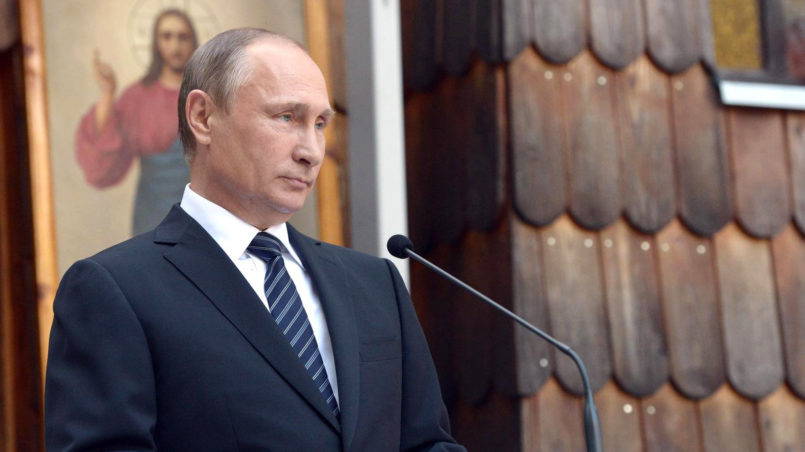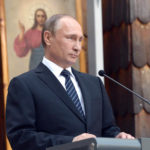Russian Elections 2018: Putin -“Candidate of the People”

Stephan Bartunek interviewed Prof. Dr. Peter Bachmaier, President of the Austrian-Belarusian Society, on the presidential elections in Russia on Sunday, 18 March 2018:
On 18 March the presidential elections will be held in Russia. It is believed that Vladimir Putin has already been chosen as the winner. Why is that?
Prof. Dr. P. Bachmaier: Putin will win the elections by a large majority, as he did the last time because there is no other alternative. He is the “candidate of the whole people”; he rebuilt the Russian state after his first election in 2000, he defended Russia in 2008 in the South Ossetia crisis and in 2014 in the Ukrainian crisis. In Syria, he supported the ally and restored the Russian world power. He defends his country against the West and NATO and has practically no opponents in Russia’s foreign policy.
Why does the opposition not play a greater role?
There are seven other candidates, including representatives of a national policy whose goals Putin is defending anyway. Candidates for a liberal direction, like Xenia Sobchak and Grigori Jawlinski, have no chance because the West is not popular with its aggressive policies. Alexander Tschuchlebow, an entrepreneur from Petersburg, was not authorised because he is permanently resident in Finland and holds Finnish citizenship. The Western candidate ,Alexei Nawalny, a lawyer and businessman who studied in Yale, originally a member of the liberal party “Jabloko“, then the national party “Narod” (The People), was sentenced to five years of labour camps (later changed to probation) for fraud and embezzlement in 2012 and was therefore not eligible for election. The candidate of the Communist Party, Pavel Grudinin, will receive most of the votes after Putin because he demands not only the defense of the country’s sovereignty but also a change in the prevailing neo-liberalism and a social policy.
How can Putin’s policy as a whole be defined?
Vladimir Putin is popular, but this does not mean that the government’s policy is generally accepted. Putin only has foreign policy and defense really in his hands. All other ministries, such as economics, finance, the National Bank, education, culture and the media are liberal. They are in touch with Washington, the IMF, the World Bank and the US Treasury Department. The economy is in the grip of the newly rich oligarchy, which, however, does not interfere with foreign policy. People are dissatisfied with their social situation, low wages, high prices and expensive rents. The reconstruction of industry, which was devastated in the Yeltsin era, has not taken place. There is a dual power and one day there must be a conflict. Critics of neo-liberal politics, such as Putin advisor Sergey Glazyev, have joined forces in the Stolypinklub to develop national economic policies and to boost the real economy.
What is Russia’s role in the Ukrainian conflict?
The Ukrainian conflict began in the West, especially in the USA, with the Orange Revolutions of 2004 and 2014, where people were also dissatisfied with the social and economic situation. But the West took advantage of this by financing countless NGOs and, in the end, armed units to defeat the government. This led to an uprising in Russian-speaking eastern Ukraine, which resulted in the founding of its own republics. The People’s Army consists of local soldiers who had supplied themselves with weapons available from the barracks. Meanwhile, they are receiving support from Russia with equipment and humanitarian aid supplies, but there are no regular Russian troops and Russia does not want to annex the area. In March 2014, a referendum was held in Crimea, which resulted in a 90% majority in favour of joining Russia.
The Western media have been campaigning for years against Russia and especially against Putin. What is the reason for this?
The pretext is the Ukrainian crisis. The West claims that Russia has interfered, that it is “aggressive” and also that it threatens other neighbouring countries. The Western media have been waging a violent campaign against Putin since the war for South Ossetia (2008), which Georgia actually started with the help of the USA, and since the Euromaidan of 2014, with the assertion that he wanted to rebuild the Soviet Union. The US and the EU have imposed sanctions against Russia on this ground. The real reason for this is that the United States is weakening Russia and refusing to allow its resurgence.
Why are NATO building bases in Poland and other Eastern European countries?
NATO, under the leadership of the United States, has not abandoned its goal of containing Russia. After the dissolution of the Soviet Union, NATO has expanded further eastwards despite American promises and has built up bases and missile positions in Poland, Romania, the Baltic countries and Ukraine. There is also support for the anti-government groups in Syria. The German journalist and Moscow correspondent, Gabriele Krone-Schmalz, therefore, speaks in her new book of an “ice age” between East and West.
Is there a danger of war between Russia and the West?
Former German Secretary of State, Willy Wimmer, talks today about the preparations for the war against Russia. U.S. special forces are stationed on the border with Russia “to strike deep into Russian territory,” writes an American analyst. Russian Foreign Minister, Sergei Lavrov, also spoke of a “dangerous situation” at the Munich Security Conference on 17 February 2018.
President Putin presented new nuclear weapons in his speech on the state of the nation to the Federal Assembly in the Kremlin on 1 March 2018, but he also said: “No-one can win a nuclear war, so let us talk to each other.”
Credits
| Image | Title | Author | License |
|---|---|---|---|
 |
Putin_at_Russian_Chapel,_Vršič_(7)- | Russian President’s official website | CC BY 4.0 |
